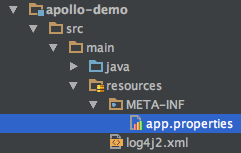|
|
há 6 anos atrás | |
|---|---|---|
| .. | ||
| doc | há 8 anos atrás | |
| src | há 6 anos atrás | |
| README.md | há 6 anos atrás | |
| pom.xml | há 6 anos atrás | |
README.md
I. Prerequisite
I.I Requirements
- Java: 1.7+
I.II Mandatory Setup
Apollo client requires AppId and Environment information available to function properly, so please read the following and configure them properly:
1. AppId
AppId is the identity for the application, which is a key information to retrieve the config from server.
AppId information should be put in classpath:/META-INF/app.properties with its key as app.id.
For example, you could place the file as the following screenshot:
And config the file as:
app.id=YOUR-APP-ID
2. Environment
Apollo supports config by multiple environments, so environment is another key information to retrieve the config from server.
Environment could be configured in 3 ways:
As Java System Property
- You could specify environment as java system property
env - For example, when starting the java application, it can be configured via
-Denv=YOUR-ENVIRONMENT - Please note the key should be lower case
- You could specify environment as java system property
As OS System Environment
- You could also specify environment as system environment
ENV - Please note the key should be UPPER CASE
- You could also specify environment as system environment
As Property File
- You could create a file
/opt/settings/server.propertieson the target machine - And specify the environment in the file as
env=YOUR-ENVIRONMENT - Please note the key should be lower case
- You could create a file
Currently, env allows the following values (case-insensitive):
- DEV
- FWS
- FAT
- UAT
- PRO
I.III Optional Setup
Cluster
Apollo supports config separated by clusters, which means for one appId and one environment, you could have different configs.
If you need this functionality, you could specify the cluster as follows:
- As Java System Property
- You could specify cluster as java system property
apollo.cluster - For example, when starting the java application, it can be configured via
-Dapollo.cluster=xxx - Please note the key should be lower case
- You could specify cluster as java system property
- As Property file
- You could create a file
/opt/settings/server.propertieson the target machine - And specify the idc cluster in the file as
idc=xxx - Please note the key should be lower case
- You could create a file
Cluster Precedence
If both
apollo.clusterandidcare specified:- We will first try to load config from cluster specified as
apollo.cluster - If not found, we will fall back to cluster specified as
idc - If still not found, we will fall back to the default cluster
default
- We will first try to load config from cluster specified as
If only
apollo.clusteris specified:- We will first try to load config from cluster specified as
apollo.cluster - If not found, we will fall back to the default cluster
default
- We will first try to load config from cluster specified as
If only
idcis specified:- We will first try to load config from cluster specified as
idc - If not found, we will fall back to the default cluster
default
- We will first try to load config from cluster specified as
If neither
apollo.clusternoridcis specified:- We will load config from the default cluster
default
- We will load config from the default cluster
II. Maven Dependency
<dependency>
<groupId>com.ctrip.framework.apollo</groupId>
<artifactId>apollo-client</artifactId>
<version>1.1.2</version>
</dependency>
III. Client Usage
1. Load config from default namespace(application)
Config config = ConfigService.getAppConfig();
String someKey = "someKeyFromDefaultNamespace";
String someDefaultValue = "someDefaultValueForTheKey";
System.out.println(String.format("Value for key %s is %s", someKey, config.getProperty(someKey, someDefaultValue)));
2. Register config change listener
Config config = ConfigService.getAppConfig();
config.addChangeListener(new ConfigChangeListener() {
@Override
public void onChange(ConfigChangeEvent changeEvent) {
System.out.println("Changes for namespace " + changeEvent.getNamespace());
for (String key : changeEvent.changedKeys()) {
ConfigChange change = changeEvent.getChange(key);
System.out.println(String.format("Found change - key: %s, oldValue: %s, newValue: %s, changeType: %s", change.getPropertyName(), change.getOldValue(), change.getNewValue(), change.getChangeType()));
}
}
});
3. Load config from public namespace
String somePublicNamespace = "CAT";
Config config = ConfigService.getConfig(somePublicNamespace);
String someKey = "someKeyFromPublicNamespace";
String someDefaultValue = "someDefaultValueForTheKey";
System.out.println(String.format("Value for key %s is %s", someKey, config.getProperty(someKey, someDefaultValue)));
